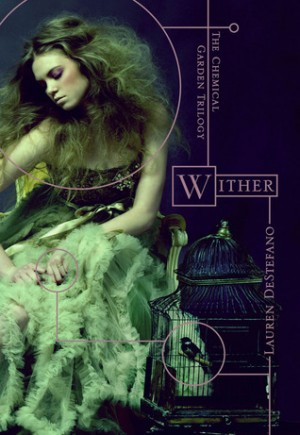At the age of sixteen, Rhine only has four more years left to live. Two generations ago, scientists found a way to create genetically perfect humans, impervious to all known diseases or mutations. But something went wrong, and the children of this first generation of perfect humans die inexplicably at a very young age: girls at the age of twenty, boys at the age of twenty-five. Geneticists are racing against time to find an antidote, but as the first generation dies out, the world is full of poverty, starvation, and orphans hoping to find some meaning before they die before their time.
Rhine is kidnapped and sold as a wife to a young Governor. She is one of three other girls–her sisterwives–who are expected to produce heirs for their husband before he, or they, die. Due to her resemblance to the Governor’s first wife, Rhine is automatically given preferential treatment. But no matter how gilded her cage is, Rhine knows that she is a captive and longs to break free and find her brother before she dies. Soon, she builds a connection with one of the servants in the house, a young man named Gabriel. Their friendship is forbidden, but as it grows into romance Rhine sees what might be her only chance to escape the Governor and find love.
I really loved the concept of this novel. The theme of mortality and time was palpable in every sentence, a current of tension that kept the novel flowing quickly. Rhine has seen many people die when they reach the end of their teen years, but that makes her trepidation no less terrifying. How is she supposed to live a fulfilling life when she only has twenty years to live? And how can she find love–and shape her own destiny–when she is kept as an unwilling wife by a powerful man?
There isn’t a lot of action in this book, so most of the focus is on Rhine and her relationships with the Governor, her sisterwives, and Gabriel. I found each relationship to be unique but believable, even her tentative friendship with the man she should hate, the pathetic and weak-willed Governor. She grows to love both her sisterwives despite their divergent personalities, and I found these friendship to be some of the most compelling in the novel. I wasn’t particularly moved by her growing romance with Gabriel, and found their relationship to be somewhat tepid throughout the book.
Overall, I enjoyed this novel. The pace lagged during a few scenes, but the concept was compelling, the characters were unique and well-drawn, and Rhine made for a sympathetic protagonist.

Yeah, that’s definitely a cool premise. I wonder if she’s a fan of Atwood.